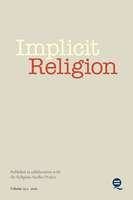
Implicit Religion
Scope & Guideline
Navigating the Subtle Realms of Faith and Identity
Introduction
Aims and Scopes
- Exploration of Non-traditional Beliefs:
The journal emphasizes the examination of belief systems that may not conform to conventional definitions of religion, including secular beliefs, spiritual practices, and cultural phenomena. - Interdisciplinary Approaches:
Implicit Religion encourages methodologies from various disciplines such as sociology, anthropology, and cognitive science to analyze belief systems, fostering a rich dialogue among scholars. - Critical Examination of Belief Constructs:
A consistent focus on deconstructing and critically analyzing the concepts of belief, fanaticism, and spiritual zeal, often within contemporary societal issues. - Intersectionality and Diversity:
The journal highlights the intersectional dynamics of religion and belief systems, particularly in relation to race, gender, and socio-political contexts. - Cultural and Historical Contextualization:
A unique contribution of the journal is its emphasis on the historical and cultural implications of belief systems, examining how they evolve and adapt over time.
Trending and Emerging
- Belief and Affectivity:
The intersection of belief and emotional experience is increasingly prominent, highlighting how feelings influence belief systems and practices, as seen in studies examining the affective dimensions of belief. - Decolonization of Religious Studies:
A rising focus on the decolonization of religious studies, particularly in relation to race and ethnicity, indicates a commitment to addressing historical biases and promoting diverse perspectives in the field. - Political Dimensions of Belief Systems:
Explorations of the interplay between politics and religion, particularly in the context of contemporary movements and phenomena like right-wing authoritarianism and cult-like behavior, are emerging as significant areas of inquiry. - Cultural Performance and Belief:
There is an increasing interest in the performative aspects of belief, examining how belief is enacted in various cultural contexts, including arts, politics, and everyday life. - Global Perspectives on Religion:
A trend towards incorporating global viewpoints and comparative analyses in the study of religion, moving beyond Western-centric narratives to embrace a more inclusive understanding of belief.
Declining or Waning
- Traditional Religious Structures:
Papers focusing on conventional religious institutions and their doctrines have seen a decline, as the journal increasingly emphasizes non-traditional beliefs and practices. - Purely Theoretical Frameworks:
There is a noticeable waning of papers that rely solely on theoretical constructs without empirical or practical relevance, as the journal seeks more applied research that addresses real-world implications. - Static Historical Analysis:
Research that merely recounts historical events or figures without integrating contemporary relevance or critical analysis appears to be less favored, as the journal values dynamic and contextual approaches to religion.
Similar Journals

JOURNAL OF RELIGION & HEALTH
Unveiling the Connections Between Spirituality and HealthJournal of Religion & Health, published by Springer, is a leading interdisciplinary journal that explores the intricate relationship between religion and health, shedding light on how spiritual beliefs and practices impact well-being. With an ISSN of 0022-4197 and E-ISSN 1573-6571, this esteemed journal seeks to bridge gaps between religious studies, medicine, and nursing, reflected in its impressive rankings, including Q2 in Medicine and Q1 in both Nursing and Religious Studies. With a converged publication history from 1961 to 2024, it stands at the forefront of scholarly discourse, emphasizing the importance of spirituality in health care. Although currently not offering open access, the journal provides valuable insights for researchers, practitioners, and students aiming to integrate spiritual considerations into health care settings. Its rigorous peer-review process ensures the publication of high-quality research that contributes to advancements in both academic and practical domains.

Nova Religio-Journal of Alternative and Emergent Religions
Unveiling the Dynamics of Contemporary Belief SystemsNova Religio: Journal of Alternative and Emergent Religions, published by University of California Press, stands at the forefront of the exploration of contemporary religious movements, innovative spiritual practices, and the complexities of belief systems outside of mainstream religion. With an impressive Q1 ranking in the Religious Studies category and a position in the top 86th percentile within its field, this journal not only addresses the academic study of alternative religiosity but also fosters discussions on emergent phenomena that are reshaping spiritual landscapes globally. As a critical platform for researchers, professionals, and students alike, Nova Religio provides rigorous peer-reviewed articles and reviews, making significant contributions to our understanding of the dynamic interactions between religion, culture, and society. Although this journal does not offer Open Access options, it remains a crucial resource for anyone seeking to engage deeply with the evolving narratives within the realm of religious studies.
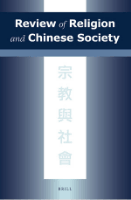
Review of Religion and Chinese Society
Navigating the Rich Tapestry of Religion in ChinaThe Review of Religion and Chinese Society, published by BRILL, is an esteemed journal that provides a critical platform for scholarly discourse at the intersection of religion and society within the Chinese context. Since its inception, the journal has devoted itself to exploring the complexities of religious practices, beliefs, and their socio-cultural implications in China, making it an invaluable resource for researchers, professionals, and students alike. With an H-index indicative of its academic rigor and a commendable ranking in the Q3 quartile across multiple fields including Arts and Humanities and Cultural Studies, this journal stands out for its insightful articles that contribute significantly to the advancement of knowledge and understanding in religious studies. Although currently not open access, it ensures wide academic reach through its distribution channels and maintains a strong emphasis on high-quality, peer-reviewed research. For those invested in the dynamic interplay of religion and society in contemporary China, the Review of Religion and Chinese Society is an essential publication that fosters academic engagement and dialogue.

Bilimname
Innovating Research in Islamic Studies and BeyondBilimname is a distinguished academic journal published by the ILAHIYAT BILIMLERI ARASTIRMA VAKFI, dedicated to advancing knowledge in the fields of Islamic studies, theology, and social sciences. With its E-ISSN: 2148-5860, this open-access journal provides a platform for researchers, scholars, and students alike to publish and share innovative ideas and groundbreaking research. While specific metrics such as H-Index and Scopus ranks are currently unavailable, Bilimname continues to foster academic discourse and engagement, making it an essential resource for individuals keen on exploring contemporary issues within its scope. Located in Kayseri, Turkey, the journal aims to bridge theoretical insights with practical applications, thereby contributing significantly to the academic community and shaping future research in relevant disciplines.
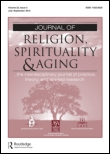
Journal of Religion Spirituality & Aging
Transforming Perspectives on Faith and LongevityThe Journal of Religion, Spirituality & Aging, published by Routledge Journals, Taylor & Francis Ltd, is a vital interdisciplinary platform that explores the intricate relationships between spirituality, religion, and the aging process. With an ISSN of 1552-8030 and an E-ISSN of 1552-8049, this journal critically addresses the evolving challenges and opportunities faced by older adults in the context of faith and spirituality. Covering a wide range of topics and methodologies, it has garnered a strong reputation in its field, achieving a Q1 ranking in Religious Studies and a Q3 ranking in Life-span and Life-course Studies for 2023. The journal serves as an essential resource for researchers, professionals, and students interested in gerontology, psychology, sociology, and related fields, fostering a deeper understanding of how spirituality can enhance the quality of life among older populations. While not an open-access journal, it continues to contribute significantly to the discourse on aging and spirituality through carefully curated scholarly articles, reviews, and studies.
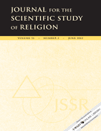
JOURNAL FOR THE SCIENTIFIC STUDY OF RELIGION
Pioneering Research in the Realm of ReligionJOURNAL FOR THE SCIENTIFIC STUDY OF RELIGION is a leading academic journal published by Wiley, dedicated to advancing the field of religious studies through rigorous empirical research and theoretical exploration. With an impressive impact factor and ranking in the Q1 category for Religious Studies, this journal has established itself as a vital resource for scholars, researchers, and students alike, positioning itself at the forefront of the discipline. Since its inception in 1977, it has provided a platform for innovative studies that explore the complexities of religion and its role in society, culture, and individual behavior. The journal is recognized among the top-tier publications in the field, holding a remarkable rank (#7 out of 644) in Scopus, reflecting the high standards of scholarship and research it publishes. Despite its non-open access nature, the journal is committed to disseminating valuable insights and fostering academic dialogue among professionals passionate about the scientific study of religion.
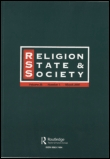
Religion State & Society
Advancing Understanding of Religion's Role in Modern LifeReligion State & Society is a prestigious academic journal published by ROUTLEDGE JOURNALS, TAYLOR & FRANCIS LTD, focusing on the intricate relationships between religion, state, and society. With an ISSN of 0963-7494 and an E-ISSN of 1465-3974, this journal serves as a vital platform for scholars and practitioners in the fields of Religious Studies, Sociology, and Political Science. As a testament to its impact, it holds a Q1 ranking in Religious Studies and a Q2 ranking in Sociology and Political Science as of 2023, reflecting its significant contribution to the academic discourse. Spanning from 1992 to 2024, the journal publishes empirical research, theoretical analyses, and critical reviews that illuminate the dynamic interplay between religion and societal structures. Located in the UK, this journal offers a unique perspective crucial for researchers, professionals, and students seeking to understand the role of religion in contemporary social and political contexts. Although it does not offer Open Access options, the journal's high Scopus rankings—the 33rd percentile in Religious Studies and the 546th in Sociology and Political Science—underscore its credibility and influence in the scholarly community.

Journal for the Academic Study of Religion
Exploring the Depths of Faith and SocietyJournal for the Academic Study of Religion, published by EQUINOX PUBLISHING LTD, is a leading peer-reviewed journal dedicated to advancing knowledge in the field of religious studies. With an impressive impact factor representing its influential position within the Q1 quartile category, this journal features high-quality research that spans a range of topics in religion, spirituality, and their intersections with contemporary societal issues. Established in 2013, it continues to be an essential resource for scholars and practitioners alike, widely recognized for its rigorous academic standards and innovative contributions to the discipline. The journal is indexed in SCOPUS, holding a prestigious rank of #148 out of 644 in its category and placing in the 77th percentile. Researchers, professionals, and students interested in deepening their understanding of religious phenomena and their implications will find valuable insights and discussions within its pages. For more information and access options, authors and readers can refer to the journal's website.
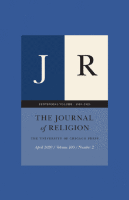
JOURNAL OF RELIGION
Fostering Dialogue on Contemporary Religious IssuesJOURNAL OF RELIGION, published by University of Chicago Press, stands as a prominent scholarly platform in the field of religious studies. With an ISSN of 0022-4189 and an E-ISSN of 1549-6538, this journal has been serving the academic community since its inception in 1982, providing a crucial forum for innovative research and critical analysis of various religious phenomena. The journal's placement in the Q3 category for Religious Studies and its ranking in the 66th percentile among peers underscore its impact within the academic landscape, making it a valuable resource for researchers and professionals alike. Although it does not offer open access, the journal remains committed to advancing knowledge in the discipline, targeting a diverse audience from students to established scholars. With upcoming issues extending to 2024, JOURNAL OF RELIGION continues to foster interdisciplinary dialogue and contribute to the understanding of religion in contemporary society.
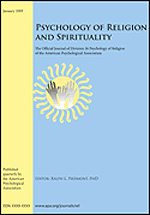
Psychology of Religion and Spirituality
Bridging Psychology and SpiritualityPsychology of Religion and Spirituality, published by the Educational Publishing Foundation - American Psychological Association, stands as a premier interdisciplinary journal dedicated to advancing the understanding of the intricate relationships between psychological principles and religious/spiritual beliefs. With a notable impact factor and esteemed rankings in key categories—such as Q2 in Applied Psychology and Q1 in Religious Studies—it highlights significant research within the realms of psychology, religion, and social psychology. The journal's commitment to fostering rigorous scholarship from 2009 to 2024 has positioned it favorably, evidenced by its impressive rankings: 3rd in Arts and Humanities in Religious Studies, 73rd in Social Psychology, and 81st in Applied Psychology according to Scopus. This journal serves as an essential platform for researchers, professionals, and students interested in exploring the psychological aspects of spirituality and religion, providing a comprehensive collection of studies that enhance our understanding of these critical dimensions of human experience.